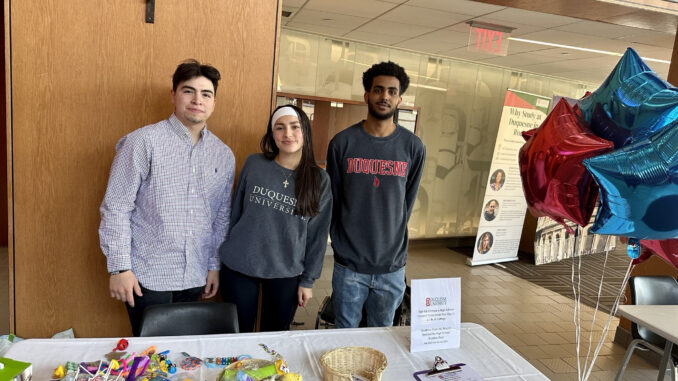
Isabella Abbott | Features Editor
For many first-generation students and students of color, college can be a difficult transition due to stigmas, anxiety and possible lower income status, according to The Clay Center for Young Healthy Minds.
A group that started during the height of the Covid-19 pandemic in 2020 at Duquesne, Pedagogy to Practice, makes it their mission to help those with similar struggles.
Aleina Smith, founder of the group, said they originally started on campus after she noticed transitional issues with her students from high school to college studies.
“It was a result of my interactions with students at both Duquesne and at another university I teach at,” Smith said, “and what was happening very simultaneously was the motivation wasn’t there for my students.”
After her realization, Smith sought to help those struggling with first-time college experiences.
“We have a duty to make sure that we can break the cycle of their struggles,” Smith said. “Some of the struggles are just the existing gaps that were in their high school experience, but also some of those struggles are the fact that a lot of people don’t want to acknowledge that college isn’t for them.”
Since many students think college is their only option post-high school graduation, Pedagogy to Practice work includes reaching out to current high school students in the area and helping them explore their options.
Student researcher Fatima Demlak, said she and other members are developing an eight-week program to collect research and interact with high school students.
She tells them about her own experiences in college.
“The workshops are mainly to help the students come up with a plan for after high school,” Demlak said. “So some of them will be focusing on financial literacy, first-generation student struggles [and] the transitions into life after high school. Then, they will be coming to Duquesne to do a shadow day where students at Duquesne will accompany one of the high school students who will be able to sit in on a college course.”
The objective of this program is to not only conduct research to improve perceptions of the benefits of higher education but also its impact on students of color and or first-generation students.
Demlak’s parents immigrated from Morocco, and her first language was not English but Arabic. As a first-generation student herself, Demlak hopes to help others in that position.
“Growing up, I was really independent because being a first-generation student as well as the person in my family who spoke the most English, I had to sort of adult fairly quickly,” Demlak said.
“So, when it came time to start looking at colleges, I didn’t really think that it was something that was going to be possible for me, but I found a way, and I want to serve as a role model for students who might look like me and might have the same struggles as me.”
Another member of the organization, Maria Ortiz, joined for similar reasons as Demlak.
“I joined to give the other students that might be in the same position as I was tips and just let them know that we all struggled and that they’re not alone,” Ortiz said.
“And to show them the resources I used and found throughout the journey of being in college that helped me become a better student.”
Smith wants students at Duquesne and those who join their organization of five to find ways to leave their own legacies at the university.
“One of the things I always encourage my students to do in all of my classes is to build relationships with their faculty members because you don’t know the full story or experience that faculty bring when they’re standing in the front of the room,” Smith said.
She believes students should try to “engage in a conversation” with their professors.
“Just knowing that an instructor considers that student should be viewed as an honor because it’s recognizing the capacity that the students have beyond the classroom,” Smith said.
The Pedagogy to Practice is always adding new items to its program, including the planning of a TED Talk, new workshops and more grants. Students are encouraged to join.
“When I first got here, I wasn’t aware of how many resources that could have helped me off the bat,” Ortiz said. “And at the end of the day you’re paying so much money to go to college and you might as well get benefits out of all the things they offer and make the best out of making relationships for the future like networking.”
Demlak said “realizing your worth” is key for first-generation students headed to college.
“Just making it to college is a big achievement in itself and being a first-generation student is about as big as it can get other than getting your degree,” Demlak said. “Just knowing that you deserve to be here as much as the next person is huge.”

